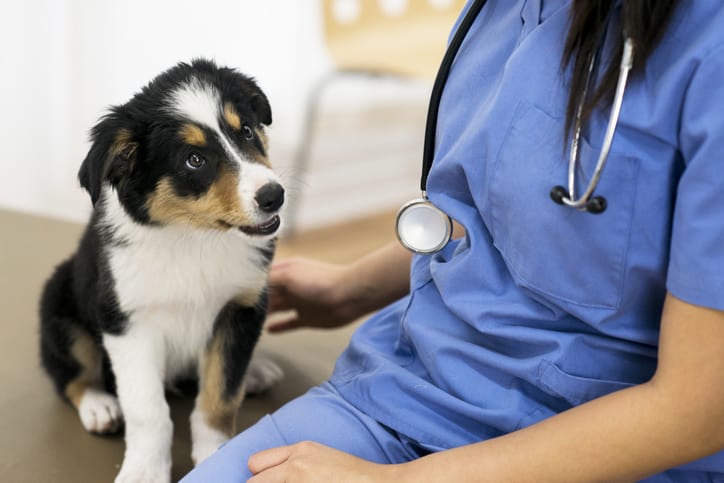So, you love your pup, and you want to provide the best care possible for him or her, but sometimes you get overwhelmed by the financial impact of having a furry companion. Totally understandable! Vaccinations alone can put quite a dent in your pocket. But while talking with your vet and making sure that your pup is vaccinated, well protected, and in good health, not all vaccinations are absolutely necessary. In fact, some veterinarian professionals and specialists believe that overvaccinating your dog is not a good thing and can actually harm your canine rather than benefit him or her. But what are the necessary dog vaccinations in Monroeville, and why are they important?
Core Dog Vaccinations in Monroeville, PA
The needed, or core dog vaccinations that are recommended are:
- distemper
- parvovirus
- hepatitis
- rabies
Rabies vaccinations are required by law in most states. Legally, this is the only dog vaccination that is absolutely required and the bare minimum that your dog needs, but most veterinarians will passionately argue that all the core vaccinations are vital to your pup’s health and safety. There is no cure for any of these infectious diseases. If by a tiny chance your dog survives the symptoms and doesn’t experience secondary infections, his or her immune system may somehow fight off the disease, but the possibility of this happening is slim to none. This is why most vets will absolutely insist that your pup receives all the core dog vaccinations necessary for prevention. Let’s take a deeper look.
Distemper is a contagious disease and is spread by an airborne virus. Naturally, your dog is going to spend plenty of time outside, and he or she will come in contact with other dogs and animals. Distemper can be transmitted by virus-containing particles in the air, and its symptoms are coughing, vomiting, diarrhea, runny nose and eyes, fever, seizures, and paralysis.
Parvovirus can be caught by direct contact with infected dogs and contaminated surfaces. It is caused by the canine parvovirus type 2, which can survive in the soil for years. The virus attacks the gastrointestinal system, and its symptoms are vomiting, fever, and bloody diarrhea.
Hepatitis is caused by the canine adenovirus virus type 1. It is contracted through infected saliva, urine, and feces, and it affects the liver and kidneys. The symptoms of this disease are depression, loss of appetite, fever, coughing, jaundice, and a tender abdomen. Bleeding disorders can also develop in severe cases. Some professionals argue that most dogs will actually recover spontaneously from this disease without any treatment.
Rabies is absolutely fatal when symptoms occur. Canines can contract it by being bitten by an infected animal or by contaminated saliva coming in contact with an open wound. Any contact with wildlife can easily pose the risk of being infected by the rabies virus. Big dog gatherings and a lot of dog parks usually require proof of a rabies vaccination before your pup can be allowed on the premises.

Will My Pet Have Side Effects from Dog Vaccinations?
Among the reasons that veterinarians give for refraining from overvaccinating your pet are the possible side effects of dog vaccinations. While most canines have no problems getting vaccinated and experience no side effects after receiving an injection, mild side effects can be common.
Symptoms of non-serious side effects usually occur within a few hours of receiving an injection and include mild fever, lowered appetite and activity, runny nose, sneezing, mild coughing, and discomfort or swelling at the injection site. Your dog may exhibit none, some, or all of these. If symptoms continue for more than twenty-four hours, you should seek immediate veterinary help.
While they are less common, serious side effects can also occur. Symptoms include itchy or bumpy skin; severe coughing or difficulty breathing; swelling of the muzzle and around the face, neck, or eyes; vomiting and diarrhea; and collapse, seizures, or paralysis. If your pup exhibits any of these signs, you should seek veterinary assistance right away.
Remember to always keep your vet well informed of your dog’s previous reactions, if any, to dog vaccinations that he or she has received in the past.
Frequency of Dog Vaccinations in Monroeville, PA
Veterinarians also say that clinical studies prove that the core dog vaccinations are actually effective for a long period of time—anywhere between seven and fifteen years. Therefore, if your dog has received his or her core vaccines after sixteen weeks of age, no further vaccinations are truly necessary for the rest of his or her life. But since vaccinations for distemper, hepatitis, parvovirus, and parainfluenza are recommended every one to two years by the American Animal Hospital Association (AAHA), and rabies vaccinations are required every one to three years, most veterinarians do not agree with this.
There is a lot to consider when deciding which dog vaccinations your pet needs and which ones he or she will be fine—or even better off—without. Be open with your vet and discuss all of your options before making any final decisions. Ready to talk with our veterinarians about your dog’s vaccinations in Monroeville, PA? Call 412-373-8580 today!

